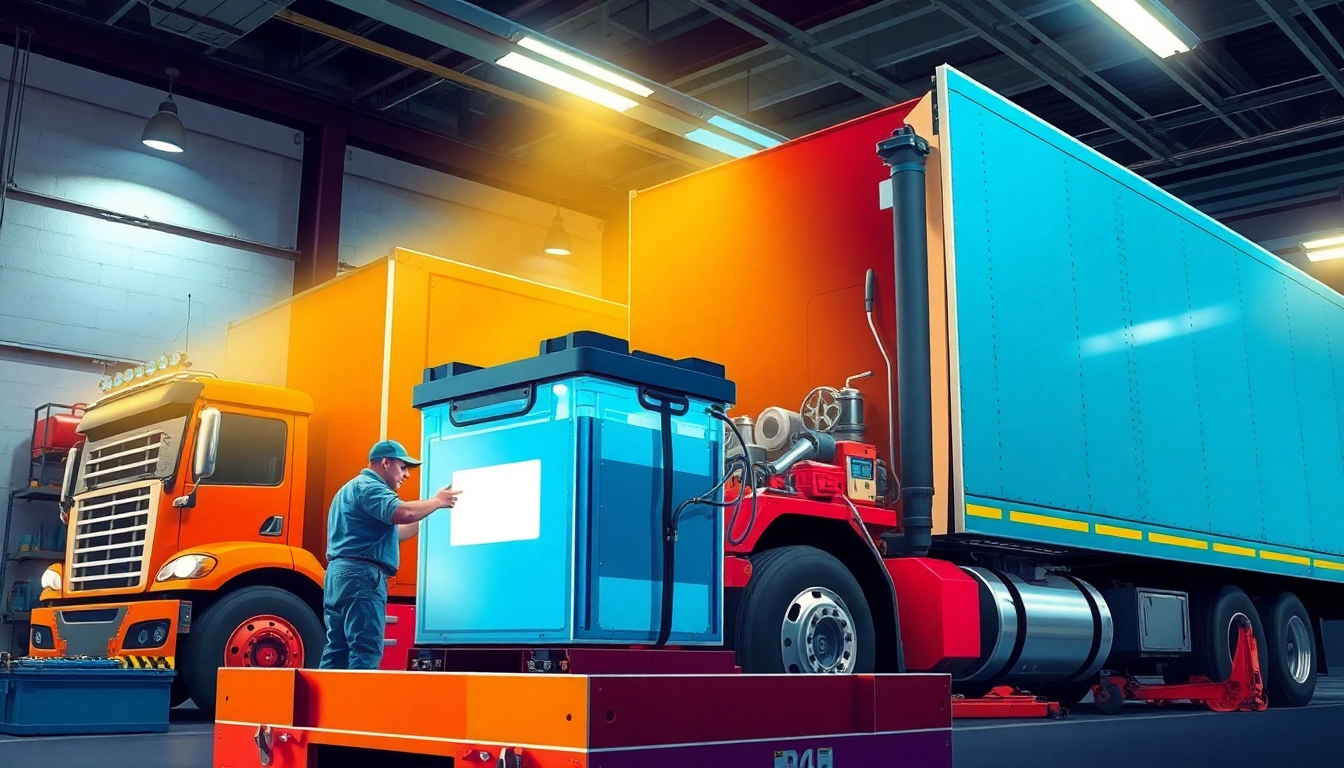Understanding Heavy Truck Batteries
Types of Batteries for Heavy Trucks
Heavy trucks rely on batteries to ensure they can operate in a variety of conditions. The main types of batteries used in heavy trucks include:
- Lead-Acid Batteries: The most commonly used type. They are cost-effective, reliable, and provide adequate power for starting needs.
- Absorbent Glass Mat (AGM) Batteries: A type of lead-acid battery with a higher performance, AGM batteries are sealed and require no maintenance. They are ideal for long-haul journeys.
- Lithium-ion Batteries: These are newer to the market and are known for their lightweight and high energy density, making them suitable for specific applications in heavy-duty scenarios.
- Gel Batteries: These batteries have an electrolyte that is in gel form, providing a longer life cycle. They are less prone to leaking and can be used in any position.
- Dual-purpose Batteries: Combining features of starting and deep cycling, these batteries can handle both engine starting and powering accessories, making them versatile for heavy truck applications.
Common Issues and Signs of Battery Failure
Batteries in heavy trucks face wear and tear due to harsh operating conditions. Here are some common issues and signs of battery failure to look out for:
- Dim Lights: If dashboard lights dim while the engine is running, it’s an indication of battery problems.
- Slow Engine Crank: Difficulty in starting the engine can signify a weak battery.
- Corrosion: Visible corrosion on battery terminals is a sign of battery deterioration.
- Swelling: Swelling or bulging of the battery casing indicates internal failure.
- Frequent Jump Starts: Needing jump starts more often than not is a major red flag.
Battery Technology Advancements
As the trucking industry evolves, so do battery technologies. Key advancements include:
- Improved Energy Density: New materials are increasing the energy density of batteries, allowing for lighter and more efficient power sources.
- Fast Charging Technology: Developments in rapid charging can minimize downtime, significantly benefiting truck operators.
- Smart Battery Management Systems: Integrating technology to monitor battery health and performance in real-time.
- Renewable Energy Solutions: Using solar power for charging batteries demonstrated the shift towards eco-friendly operations.
- Battery Recycling Initiatives: Efforts focused on recycling used truck batteries to recover valuable materials are expected to become standard practices.
Battery Replacement Process
Step-by-Step Guide to Replacement
Replacing a heavy truck battery is a crucial maintenance task that can prevent breakdowns on the road. Follow these steps for a successful battery replacement:
- Preparation: Ensure all necessary tools are available and follow safety precautions.
- Disconnect the Old Battery: Start with the negative terminal (black), followed by the positive terminal (red).
- Remove the Old Battery: Carefully lift the battery from its cradle, ensuring not to disturb other components.
- Clean the Battery Tray: Remove any corrosion or debris from the battery tray for the new battery to sit correctly.
- Install the New Battery: Place the new battery into the tray, connecting the positive terminal first, then the negative.
- Check Connections: Ensure that all connections are tight and secure.
- Test the Setup: Start the truck to ensure the new battery is functioning properly.
Tools Required for Successful Replacement
Having the right tools at hand makes the battery replacement process much smoother. Essential tools include:
- Socket wrench set
- Safety goggles and gloves
- Wire brush for cleaning terminals
- Wrenches for terminal bolts
- Volt meter for checking battery voltage
- Battery terminal protector spray
Safety Precautions to Follow
Safety should always be the priority when working with batteries. Follow these guidelines:
- Always wear protective gear, including gloves and goggles.
- Ensure the vehicle is turned off before working on the battery.
- Work in a well-ventilated area to avoid harmful gas inhalation.
- Do not smoke or keep flammable items near the battery.
- Be cautious with tools to prevent short circuits.
Choosing the Right Battery
Key Specifications for Heavy Duty Use
When selecting a battery for a heavy truck, consider the following specifications:
- Cold Cranking Amps (CCA): Indicates the battery’s ability to start in cold conditions. Higher CCA ratings are necessary for heavy trucks.
- Reserve Capacity (RC): Measures how long the battery can run without the engine, crucial for trucks with additional power demands.
- Physical Size: Ensure that the battery fits securely in the tray.
- Brand Reliability: Opt for reputable brands known for quality and performance.
- Warranty Period: A good warranty indicates manufacturer confidence in product reliability and longevity.
Budgeting for Battery Replacement Costs
Understanding the costs involved in battery replacement is critical for budgeting:
- Battery Costs: Prices vary significantly depending on type and specifications (lead-acid, AGM, lithium). Expect prices to range from $150 to $800.
- Labor Costs: If you opt for professional replacement services, labor costs will add an additional $50 to $150.
- Potential Additional Expenses: Include costs for tools or cleaning equipment that might be necessary during the replacement.
Popular Brands and Models
Several brands are recognized for their reliable heavy truck batteries. Some noteworthy options include:
- Interstate Batteries: Known for their vast selection and dependable performance.
- ODYSSEY: Their Extreme Series is highly rated for durability and endurance.
- AC Delco: Offers batteries backed by a good reputation and performance metrics.
- Exide: Known for high-quality deep-cycle batteries.
- Motive Battery: Offers lithium batteries that are gaining popularity in the heavy haul sector.
After Replacement Care and Maintenance
Maintenance Tips for Longevity
Maintaining a heavy truck battery properly boosts longevity. Here’s how you can care for it:
- Regular Cleaning: Clean battery terminals and connections to prevent corrosion.
- Check Electrolyte Levels: For non-sealed batteries, ensure electrolyte levels are adequate.
- Secure Connections: Verify that all terminal connections are tight and free of corrosion.
- Monitor Battery Charge: Use a volt meter to check battery voltage regularly.
- Avoid Deep Discharges: Keep the battery charged and avoid deep discharges.
Signs You Need a Battery Check-Up
Regularly checking your battery state can prevent unexpected failures. Look out for these signs:
- Frequent warnings or dashboard alerts related to the battery.
- Visible swelling or leakage from the battery casing.
- Unusual smells or gas releases from the battery area.
- Uncommon noises when starting the truck.
Understanding Warranty Options
Familiarizing yourself with warranty options can save you trouble down the road. Consider the following:
- Duration: Most warranties range from 1 to 3 years, depending on the manufacturer and battery type.
- Coverage: Read the specifics of what’s included—some warranties only cover manufacturing defects.
- Claim Process: Understand how to file a claim to effectively manage warranty issues.
Future Trends in Truck Battery Technology
Emerging Technologies: Lithium and Beyond
The future of truck battery technology is rapidly evolving, with several promising trends:
- Lithium-Sulfur Batteries: Expected to offer higher capacity and longer life than lithium-ion batteries.
- Solid-State Batteries: These batteries are more efficient and safer than traditional lithium-ion, opening opportunities for electric heavy trucks.
- Supercapacitors: These can store and release energy rapidly, complementing battery systems for enhanced efficiency in heavy loads.
Impact of Eco-Friendly Alternatives
With the industry moving towards sustainability, eco-friendly battery solutions are gaining traction:
- Recycled Materials: Many manufacturers are utilizing recycled materials to create batteries and reduce waste.
- Less Toxic Components: Newer batteries are being developed with less environmental impact components.
- Renewable Energy Integration: Businesses are exploring solar and wind energy to charge batteries, reducing carbon footprints.
What to Expect in the Coming Years
The trucking industry should anticipate several changes in battery technology, including:
- Increased Availability of Better Batteries: Manufacturers are racing to produce advanced technologies to meet growing demand.
- E-Waste Initiatives: As battery technology progresses, so does the focus on proper disposal and recycling methods for old batteries.
- Regulatory Changes: Expect government regulations focused on battery safety, recycling, and sustainable materials in manufacturing processes.


